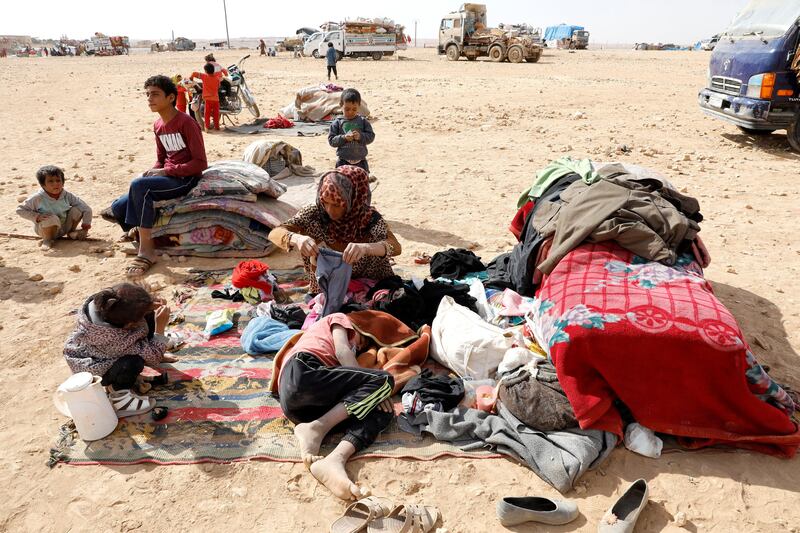Ain Issa // US-backed forces launched the "final phase" of the battle to retake Raqqa after the city was evacuated except for a hard core of ISIL fighters and their families.
More than 3,000 civilians fled city on Saturday night under a deal that left just a few hundred foreign extremists and some of their relatives in the handful of positions they still occupy in the city, which was once ISIL’s main stronghold.
The deal opens the way for a final assault by the Syrian Democratic Forces, a Kurdish-Arab militia alliance that advanced into Raqqa in June and has since captured 90 per cent of the city.
Raqqa was the first big Syrian city captured by ISIL as it declared a "caliphate" and rampaged through Syria and Iraq in 2014.
The 3,000 civilians had evacuated to areas controlled by the SDF under a deal negotiated between officials from the Raqqa Civil Council and Syrian ISIL fighters, SDF spokesman Talal Sello said.
"Raqqa is now empty of civilians who had been taken as human shields," he said.
"Only 250 to 300 foreign terrorists who refused the deal and decided to stay and fight until the end remain in the city, and relatives of some members are with them," he said.
Some 275 Syrian ISIL fighters and family members had also left extremist-held parts of the city and were with SDF fighters.
"We are now in the final phase of the battle for Raqqa," Jihan Sheikh Ahmed, spokeswoman for the SDF's Raqqa campaign, said.
The fighting would "end the presence of the terrorist mercenaries inside the city".
"The battle... will continue until the entire city is cleared of terrorists who refuse to surrender, including foreign terrorists."
There had been speculation for days about a deal to allow the SDF to capture the last parts of the city while preventing further civilian casualties.
But there had been contradictory reports about whether the deal would allow foreign ISIL fighters to leave, something that has been strongly opposed by the US-led coalition supporting the SDF.
The Raqqa Civil Council denied on Sunday afternoon that foreign ISIL fighters had been allowed to leave the city, after one of its members said "a portion of the foreigners have left."
The Council said: "Those who have surrendered are only Syrians, and they number a total of 275 including their families."
The convoy would head to the remaining ISIL territory in eastern Syria, Omar Alloush of the Council said on Saturday.
The agreement was brokered by the council and tribal elders to "minimise civilian casualties”. Tribal leaders from Raqqa said they sought to prevent bloodshed among civilians still trapped in the city
The US-led coalition had on Saturday announced a convoy would leave the city, specifying that it would not include foreign ISIL fighters.
"We're very adamant about not allowing foreign fighters to leave the city," coalition spokesman Colonel Ryan Dillon said.
"Our stance was they either stay and fight or they surrender unconditionally."
"The last thing we want is foreign fighters to go free so they can return to their countries of origin and cause more terror and more havoc," he added.
"This is a local solution," he said. "While we may not fully agree with our partners sometimes, we have to respect their own solutions to their issues."
Fighters who left in the convoy, which the coalition is tracking, had given biometric data including fingerprints, Col Dillon said.
Such withdrawals of fighters along with groups of civilians have grown commonplace in Syria's six-year war, as a way for besieging forces to accelerate the fall of populated areas.
In August, the coalition spent weeks preventing a convoy of ISIL fighters from leaving an enclave on the Syrian-Lebanon border and reaching extremist territory in eastern Syria.
ISIL captured Raqqa in 2014, and under its rule the city become synonymous with the group's worst abuses, and was transformed into a planning centre for attacks abroad.
As the group became more entrenched in Syria and Iraq leading up to its capture of Mosul in June that year, Raqqa became its most important centre, and it celebrated its series of victories with a massive parade through the city.
Many of its top leaders were at times based there, and former hostages said Mohammed Emwazi, better known as Jihadi John, imprisoned them along with those he later executed, in a building near an oil installation near the city.
The group killed dozens of captured Syrian soldiers there in July 2014 and it was also the site of a slave market for Yazidi women captured in Iraq and given to fighters.
The coalition has said Raqqa was a hub for attacks abroad, and in November 2015, after militants killed more than 130 people in Paris, France launched air strikes on Islamic State targets inside Raqqa.
The loss of Raqqa would be the latest blow for ISIL, which has suffered a string of setbacks in recent months.
It was driven from its largest Iraqi stronghold Mosul in July and now holds only a sliver of territory in the country.
In Syria, its presence is largely confined to the eastern province of Deir Ezzor, where it is under attack by both the SDF and a Russia-backed Syrian government campaign.
On Saturday, Syria's army seized the former ISIL stronghold of Mayadeen in Deir Ezzor.
*With reporting from Reuters and Agence France-Presse






